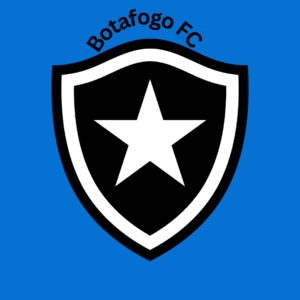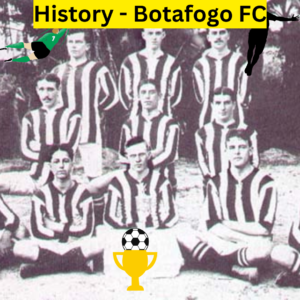History of Botafogo FC
The history of Botafogo FC – Botafogo de Futebol e Regatas, commonly known as Botafogo, is one of the most famous and historic football clubs in Brazil. The club was founded on July 12, 1904, in Rio de Janeiro, and its formation has its origins in the merging of two distinct sporting organizations.
The first entity involved in the club’s creation was the Botafogo Football Club, founded by a group of sports enthusiasts from the upper classes of Rio de Janeiro. This team was focused on the game of football and aimed to create an elite club for the city’s burgeoning football scene. However, at this time, Brazil’s football scene was still in its infancy, and the sport was yet to reach the popularity it enjoys today.

The second element that contributed to the creation of Botafogo FC was the Botafogo Rowing Club, which had been founded earlier in 1894. This rowing club was one of Rio de Janeiro’s most prominent and long-standing sports clubs. The merging of both the football club and the rowing club in 1942 solidified Botafogo’s status as a multi-sport institution. The combination of football and rowing was particularly significant for the club’s early identity.
In its early years, Botafogo’s football team was a pioneer in promoting the game across Brazil. The club enjoyed success in various regional tournaments in Rio de Janeiro, with the team winning its first Carioca Championship in 1907. This victory helped establish Botafogo as one of the top clubs in the state and set the stage for future success.
Botafogo’s golden era began in the 1950s when the club was home to some of the best football talent in Brazil, including Garrincha, one of the greatest footballers in Brazilian history. Garrincha’s time at the club was crucial to Botafogo’s prominence, and during the early 1960s, the club won multiple Carioca Championships and enjoyed consistent success in both domestic and international competitions.
Botafogo’s rich history is also tied to its passionate fan base, known as the “Botafoguenses”. The club’s home, the Estádio Nilton Santos, often referred to as the Maracanãzinho, is a symbol of Botafogo’s footballing legacy. Throughout the decades, the club has maintained its stature in Brazilian football, competing at the highest level in Serie A and producing world-class players.
Today, Botafogo de Futebol e Regatas continues to be a major force in Brazilian football, with a proud legacy of contributions to the sport both domestically and internationally. Its success story, combined with its iconic players and passionate fan base, has made Botafogo a football institution in Brazil.

10 interesting facts about Botafogo FC
- Botafogo’s Iconic Black and White Stripes
Botafogo is instantly recognizable by its black and white striped kit. The club’s colors were inspired by the traditional colors of the Botafogo Rowing Club, the club’s predecessor. The black and white stripes have become a symbol of the club’s identity and are one of the most iconic kits in Brazilian football. - Garrincha’s Legacy at Botafogo
One of the most famous figures in Brazilian football, Garrincha, played for Botafogo during his career. Known as “The Little Bird,” Garrincha is considered one of the greatest dribblers of all time. His time at Botafogo in the 1950s and 1960s coincided with the club’s golden era. He helped lead Botafogo to several Carioca Championship victories and contributed to Brazil’s 1958 FIFA World Cup - Estádio Nilton Santos
Estádio Nilton Santos, also known as Maracanãzinho, is the home stadium of Botafogo. Named after the legendary Brazilian player Nilton Santos, it was opened in 2007 and has become a symbol of the club’s modern ambitions. The stadium has been a key venue for various national and international competitions, and it remains a proud asset for Botafogo’s fanbase. - The Origin of the Name “Botafogo”
The name “Botafogo” is derived from a small neighborhood in Rio de Janeiro. The area was historically known for its beautiful views of the sea and is also the site of the Botafogo Rowing Club. The name “Botafogo” itself means “to light the fire,” a symbolic reference to the club’s ambition to ignite a passion for football and sport in Brazil. - Botafogo’s “Glorious” Nickname
Botafogo is often referred to as the “Glorious” or “Glorioso” This nickname is a tribute to the club’s rich history, legendary players, and its enduring legacy in Brazilian football. Botafogo’s faithful fans often chant this nickname, emphasizing the club’s longstanding success and respect within the footballing world. - The First Club to Have a Professional Football Team in Brazil
Botafogo was one of the first clubs in Brazil to form a professional football team. The club helped pave the way for the future of professional football in Brazil, promoting the sport and setting high standards for the development of the game in the country. - Botafogo’s Historic Rivalry with Flamengo and Fluminense
As one of the top football clubs in Rio de Janeiro, Botafogo shares a fierce rivalry with Flamengo and Fluminense, known as the “Carioca Derby”. These matches, particularly against Flamengo, are among the most anticipated in Brazilian football. The rivalry reflects the passionate and competitive spirit of Rio de Janeiro’s football scene. - Botafogo’s Impact on Women’s Football
While Botafogo is historically associated with men’s football, the club has also made important strides in the development of women’s football in Brazil. In recent years, Botafogo’s women’s team has gained recognition for its performance in the Campeonato Brasileiro de Futebol Feminino, helping raise the profile of women’s football in Brazil. - The “Botafogo Stars”
Botafogo has produced many footballing stars, including Jairzinho, Didi, and Amarildo, all of whom were part of the legendary Brazilian squads that won the FIFA World Cup. These players contributed to the club’s international reputation and helped cement Botafogo’s place in football history. - The Club’s Role in Brazilian Football History
Botafogo played a key role in the formation of the Brazilian Football Confederation (CBF). As one of the leading clubs in Brazil, Botafogo contributed to the shaping of national football regulations and the development of the sport on a national level. Their influence extends beyond the field, as the club has had a significant impact on the growth of football across Brazil.
These lesser-known facts highlight Botafogo’s enduring legacy, unique characteristics, and contributions to the development of football, not just in Rio de Janeiro, but in Brazil as a whole.

That is very interesting, You’re an overly skilled blogger. I’ve joined your rss feed and stay up for in quest of more of your fantastic post. Additionally, I’ve shared your website in my social networks!
Thank you.